#I wrote the other kidnapped guy thinking of Dick but if you prefer to switch him out it works too
Text
Make off (dp x dc)
The important thing here was not to panic, Jazz thought to herself as she strained against her restraints fruitlessly. She tried to take a deep breath but the dirty gag that had been shoved into her mouth made it hard to do. In fact, with the way the left side of her face was swelling due to that punch she'd gotten earlier, breathing was hard in general right now. Jazz was in bad shape and she knew it.
She'd known Gotham was a dangerous choice, but she'd thought if she took precautions, if she stayed out of everything, she would be fine. She was a psych major in a city with lots of insane psychopaths, sure, but she was angling for family therapy, which was very much not going to put her anywhere near the infamous Arkham. And yet.
Jazz closed her eyes. It was useless to dwell on the past when she needed all her capacities to escape her current situation. She consciously did not look over to the misshapen pile she could see in a corner of the room, and very carefully did not take note of how she could distinguish the shape of something that looked like a cut off arm. Instead, she looked to the side, towards a slumped, tied up figure. He looked to be in his early twenties. Jazz managed to nudge at him with her foot in an attempt to wake him up.
It took a few tries before the guy started moving. It had taken the guy a second to come to, and when he did it was with a muffled shout. Jazz looked around, alarmed that someone had heard. She desperately tried to catch his eye as she vigorously shook her head in an attempt to signal him to shut up. He seemed to understand the message, but it was unfortunately too late.
"Oh, good. The new shipment is awake." It was a man in a white lab coat that had come out of a door off to the side. He was wearing surgical gloves and had rolled in a gurney. Jazz backed away from the man which simultaneously pressed herself into the wall, behind the other victim. As she did she felt a sharp pain in her arm as something sharp pressed into it. Could it be?
"I usually have more in stock but harvest has been poor lately."
Jazz made a show of pressing herself closer to the wall in fear to disguise her tracing the outline of the sharp thing. It felt like a piece of metal that was sticking out of the broken down, rusty walls.
The man in white looked over at her before he turned his attention towards the other victim. He strode over, crouched next to the bound man before grabbing his chin to tilt it upwards. The guy struggled against the grip but their kidnapper held firm.
Jazz took the opportunity to position her bound hands against the sharp thing and start sawing her restraint on the sharp edge experimentally. Back and forth.
"Hm," the scientist mused as he turned the guy's face to the sides, before letting go and brushing his hand against his pristine pants. Jazz stopped moving. "You'll do," he concluded before turning towards the gurney and taking a few things out of the side pockets.
Jazz started on the sawing again, this time more vigorously, grateful her partner in adversity was partially hiding her by the way he was positioned. She looked up to make sure her abductor was busy and caught him inserting the needle of a syringe into a bottle of unknown substance. She stifled a hiss as she cut the skin of her wrist on accident, and carried on her repetitive motion. She could feel the zip-tie starting to give way when the creep turned back towards them with a full syringe.
"Here we go," he said as he turned towards the younger man who just glared at him. The creep paid it no mind as he plunged the syringe into the younger guy's neck and pushed the plunger all the way down. Her fellow captive tried to headbutt the creep but he evaded it.
The creep turned back towards the gurney and Jazz took the chance. She gave a big heave and was rewarded by the snap of the zip-ties. After that it all happened very fast.
The creep started to turn around, only to be met with Jazz's roundhouse kick to the head. She immediately turned to the gurney, betting on there being a scalpel and was rewarded with the sight of a surgical knife instead. She grabbed it and made short work of her fellow captive's restraint.
As she was helping his up, a voice came from the corridor the creep had come out. "Boss?"
Jazz froze.
"You ok, Boss?" came a second voice.
Jazz looked to the now-freed man who looked back intently, though she could see how hard he was trying not to lose focus. Whatever was in the syringe was starting to take hold. She didn't know how many guys where there and her companion was clearly in no condition to help her fight. Their best chance was to run away and regroup later.
Jazz didn't have time to hesitate, she grabbed the guy's arm and started running down one of the tunnels leading away from the approaching voices.
Hopefully a head-start would be enough to make up for her flagging companion.
#this is supposed to be the dollmaker but my research into him was very minimal so might be wildly ooc#I wrote the other kidnapped guy thinking of Dick but if you prefer to switch him out it works too#jazz fenton#Dick Grayson#dc x dp#dp x dc#roxpox#roxpoxwrote#tw violence#just in case
243 notes
·
View notes
Text
Tintin in the 21st Century
It’s weird that Tintin is only really known in continental Europe, and obscure as hell in the UK, because it was localised extremely well - so much so that it really confused me as a kid when, in The Black Island, Tintin takes a ferry over to Britain. If he tends to be knocking about in Brussels pre-adventure, I certainly didn’t notice.
What tends to get emphasised about Tintin these days is the racism - as in this Robert Brockway column - and yes, Tintin in the Congo comes off like Kipling’s The White Man’s Burden crossed with those episodes of Looney Tunes that they won’t broadcast any more, but Herge himself disavowed that one as being basically early installment weirdness. There is a good deal of fairly iffy content in some of the others, including, in Shooting Star, a scheming Jewish financier serving as antagonist (which to be fair, Herge wrote while living under Nazi occupation, and later edited), but none of this was key to the comic’s appeal.
What I’m criticising specifically here is Brockway’s assertion that “Nobody knows how to deal with the racism. [Modern adaptations] keep trying to whitewash it -- pun so totally intended, friend-o -- and every time they do, they act surprised that the property has lost all its magic”, an assertion he illustrates entirely with excerpts from Tintin in the Congo and Tintin in the Land of Soviets (an even earlier work than Congo and an anti-communist tract in which Tintin is a prick to everyone in Russia). I’m well aware that this all may come off as a white European trying desperately to salvage one of his Boy’s Own mighty-whitey heroes from the dustbin of history, but look at the following excerpts:

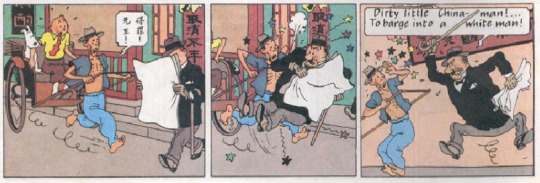
(The next panel is Tintin breaking this awful man’s cane. There’s a lot of instances like this throughout the series, where someone’s being a dick to a POC, and Tintin lets them have it. Yes, it’s robbing the POC of agency in favour of Tintin as mightiest of whities, you could call it racist, but it’s not quite a Klan march, is it?)
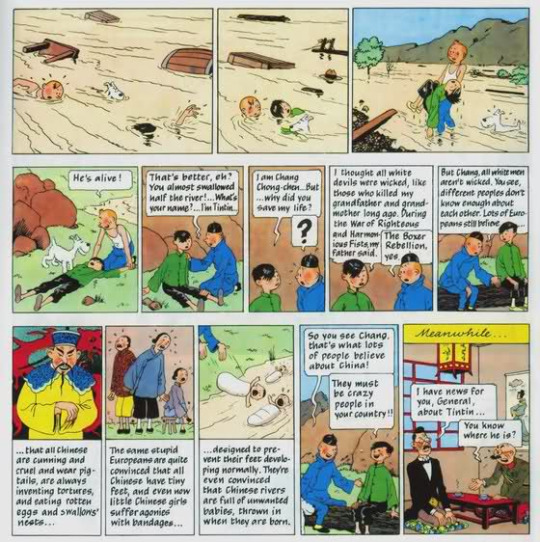
Certainly they’re depicting racism, but is anyone really looking at those and getting the impression that the author endorses Native Americans being thrown off their land? Or that the author agrees with the stereotypes he’s calling people stupid for believing? (The stereotypical Chinaman picture serves as a bit of a brick joke when, later on, Thomson and Thompson attempt to blend in.) Those last two excerpts are from The Blue Lotus, often held up along with Tintin in Tibet as a rebuttal to the charges of racism laid against Herge (largely because of Chang, based on one of Herge’s life-long friends). Ironically, The Blue Lotus was criticised for racism against the Japanese: the villain, Mitsuhirato (that’s him in the last panel) is a pug-nosed, buck-toothed opium trafficker who commits seppuku after the climax, so it’s a fair cop, although The Blue Lotus depicting Imperial Japan as authoritarian warmongers claiming more and more of Manchuria on flimsy pretexts has perhaps been vindicated by history.
Brockway’s column describes Tintin as ‘a racist Indiana Jones...for kids’, and this is basically accurate, although I think it’s debatable whether Tintin is more Indiana Jones or James Bond. (Last Crusade, apparently, began life as Spielberg’s Tintin fan script.) You could easily go with both - the crucial points are the globe-trotting, the intrigue, and Tintin’s own indomitable capability. To paraphrase another Cracked columnist, the weird thing about Tintin is that he was awesome. He looks like a cherub but will happily get mixed up in, and win, a fistfight or gunfight any day. He’s about 19 and already has a nemesis - a Greek nemesis. Despite being half a boy, and despite being a journalist who never writes anything, he’s self-sufficient in every way, and as physically capable as a man twice his size - which can flow back into the mighty whitey stuff in some fairly unfortunate ways:
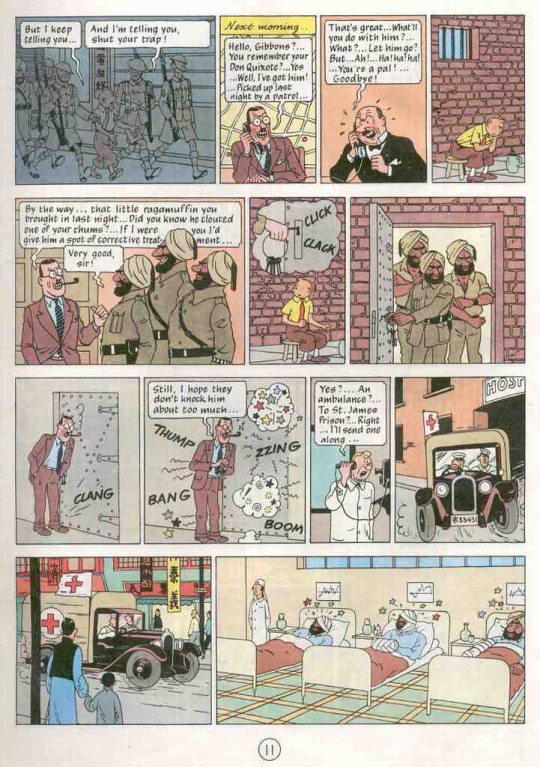
but then again, take the racial dynamic out of that page (or, if you prefer, focus more on the white colonialists bossing about the South Asian guys) and it’s pretty standard protagonisty stuff.
The series is ‘for kids’ in that Tintin is your classic boy hero - given his trusty dog companion, it’s a lot like one of The Famous Five aged a few years and got a real job - and a lot of the humour is generally accessible, slapstick stuff - there’s a bit in Tintin in Tibet where Captain Haddock spends about three pages bumping into people and tripping over. Then, out of nowhere, an international arms dealer will plant opium in Tintin’s luggage to get him banged up by the cops. Seriously, most of the villains are gun-runners, opium smugglers, or both - there’s nothing too graphic, no Trainspotting-style illustrations of the full horror of the global opiate trade, but still, heavy stuff for a comic book. Particularly considering the great costumed comic heroes never even touched the subject of drugs until around the ‘80s, and an endless stream of edutainment telling kids to hey, just say no, man.
One crucial difference between Tintin and Indiana Jones/James Bond is the series’s utter sexlessness. Female figures, on the rare occasion they show up at all, are either damsels in distress, desexualised mother-types, or both. This aspect of the series has drawn its share of Freudian analysis over the years, and, due to Tintin’s best friend and roommate being salty seaman Captain Haddock, came in for a bit of ribbing in the bootleg Tintin in Thailand. If you were to put James Bond into that machine from Red Dwarf that splits things into their good and evil selves, you’d end up with Tintin and Sterling Archer.
Really, Tintin’s closer to a modernist-era Hitchcock protagonist, who gets swept up in events and has sufficient pluck to see them through, and while I forget which way round the inspiration came, The Black Island bears a striking resemblance to Hitch’s The 39 Steps. To stick with The Black Island a moment - being half-Scottish, it was always a family favourite - I’d just like to present the first page in full:

Take note, any film or narrative that wants me to spend fifteen minutes with idiots, because that’s how you kick off an adventure. There’s your wholesome protagonist out for a walk with his dog, and there’s your bad dudes up to bad shit. Tintin spends the night in hospital, then proceeds to walk off the bullet going after the guys - who, it turns out, are some conspicuously German forgers operating in Britain, in 1938. Again, there’s nothing too graphic, but perhaps that’s bending the definition of the word for a work that involves the protagonist stepping in a bear trap, nearly being consigned to a Nazi asylum, getting knocked out during a gunfight with a White Russian when his bullets smash some bottles of chloroform, and then getting caught in a house fire (all this, incidentally, happens in one sequence of five pages or so).
To return to The Blue Lotus, one of Tintin’s allies in that, Mr Wang Chen-yee, more-or-less fits the bill for @thathopeyetlives and @raggedjackscarlet‘s idea of a mirror-universe Rocky Horror Picture Show, in which Bizarro Frank-N-Furter comes to represent the good side of traditionalism, the idea that ‘here is something worth believing in, if you dare to’:
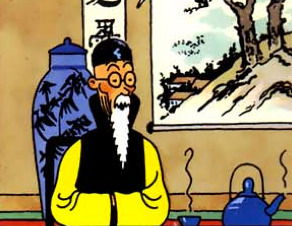
Yeah, he’s a stereotype - you know it, I know it - he’s that specific kind of East Asian man they invented the word ‘venerable’ for, and the fact that at no point in The Blue Lotus does he use kung fu to devastating effect just makes you more certain he’s a master of it. But crucially, he seems like - as with Speedy Gonzales - the kind of stereotype the people it depicts could really get behind.
Mr Wang is the leader of The Sons of the Dragon, a secret society - and a robust, active secret society at that, much closer to the mafia than to the Freemasons (or, if you like, closer to the classic Freemasons than the modern Freemasons). Tintin first meets him after having been kidnapped and smuggled back into China, on his orders - and Mr Wang is hoping that Tintin will help them to fight opium smuggling. How perfect is that for a secret society? There’s your completely justified underdog, there’s something you can believe in, or at least you could before world governments introduced some anti-drugs boilerplate and fucked everything up for everyone.
There was a very mild religious grounding to Tintin - it didn’t come up a lot, but to be fair these were still the days when religion and a moral core were thought of as basically one and the same. It wasn’t lessons in theology like Linus in Peanuts, it was a more general use of universally recognisable icons, a lot closer to how Baikinman was elevated to go-to antagonist symbol in Japan - here’s the villains of Tintin and the Broken Ear being literally dragged off to hell:

Here’s Tintin invoking heaven’s name to try and stop the villain from capping himself (luckily, his gun’s been switched for a joke one):

And here’s Snowy grappling with his alcohol problem via his good and evil selves:
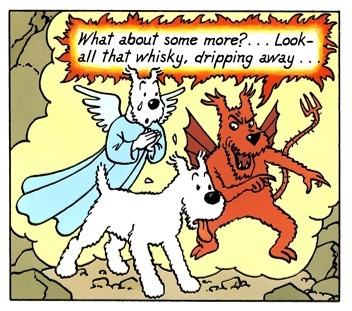
(That’s not a joke. Snowy’s taste for hard liquor was a recurring theme, at one point leading to Tintin spanking him as punishment for getting drunk in the Himalayas and nearly going over a waterfall - both content which I suspect simply wouldn’t fly today in the face of the animal rights lobby, at least not in a children’s book.)
Interestingly, this isn’t limited to Christian theology - here’s Snowy again, this time envisioning Tintin’s wrath by having him wield Zeus-style thunderbolts:
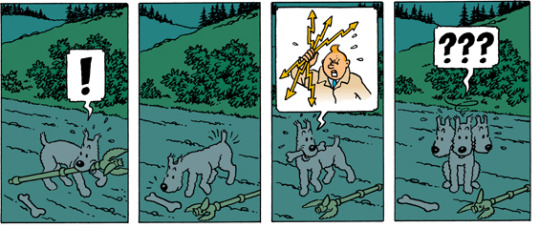
And a Buddhist monk levitating while in a prophetic trance:
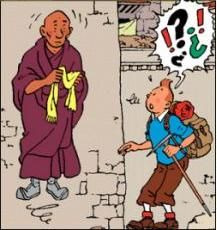
Similarly, bona fide magic makes some semi-regular appearances in the series. In Cigars of the Pharaoh, Tintin is temporarily hypnotised with one glance from a fakir, but the most audacious depiction of this comes in The Seven Crystal Balls/Prisoners of the Sun, in which ball lightning attacks the gang, causing Professor Calculus to levitate, and it turns out the neo-Incas have been using what are essentially voodoo dolls to torment the explorers who looted their temple - this is particularly jarring in Prisoners of the Sun, contrasted as it is with Tintin’s little yay-science moment of getting out of his own execution by exploiting his knowledge of an upcoming solar eclipse.
In a way, all this magic and the various acts of god were an extension of the deus ex machinas that were a staple of the series from the start. Tintin in America is probably the worst offender in this regard, with the most ridiculous moment being a toss-up between the time the meatpackers go on strike and turn off the machinery seconds before gangsters throw him into it, and the time he gets chained to a barbell and thrown in a lake, only to discover the barbell’s inexplicably been switched with the wooden barbell of a crooked strongman.
Come the later adventures, though, the deus ex machinas would take a slightly different form to the literal intervention of god:
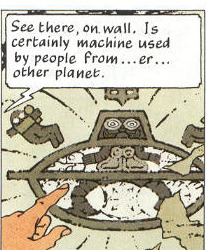
That’s not out of context, that’s not an idle aside - in Flight 714, the second-to-last complete comic, the gang gets out of a tight spot (an erupting volcano-cum-ancient ruin, no less!) when literal fucking aliens turn up to save the day and cart off the baddies. And, unlike most narratives of that ilk, they get out of it with definitive proof of extraterrestrial contact - Professor Calculus brings back a bit of metal composed of an alloy that does not exist on earth, although this is played off as a product of his cloth-eared eccentricity.
Even with the time difference, you’d probably say there’s surely a bit of a leap between the wholesome-but gritty early exploits of Tintin, where he’s running around after forgers and smugglers, and where he’s literally encountering aliens. Fortunately, there was an adventure that bridged that gap very nicely:
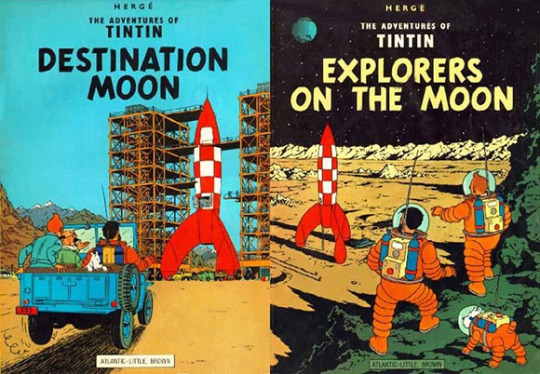
And you may well gather from that adorably kitsch rocket that this went down long before the actual moon landings - but despite this, Herge had done his research, he didn’t have the place turn out to be composed of cheddar like Wallace and Gromit’s A Grand Day Out, he depicted space travel and lunar survival reasonably accurately. A lot of people credit the white expanses of Tintin in Tibet as Herge’s masterpiece, but man, the inky blackness of Explorers is surely its underdog brother:

The final adventure, Tintin and Alph-Art, exists only as concept art and various bootleg versions. It features some genuinely radical departures from the established norm - a black Jamaican artist gets to have a heroic moment of his own, rather than just being acted upon by white people, and Tintin plans a date with an actual human woman. So the series obviously had come a long way from the days of publishing a version of Heart of Darkness where Kurtz is the good guy. And to go back to where we started - it’s not like we had to write off Bugs Bunny because of all the times he blacked up, right?
38 notes
·
View notes